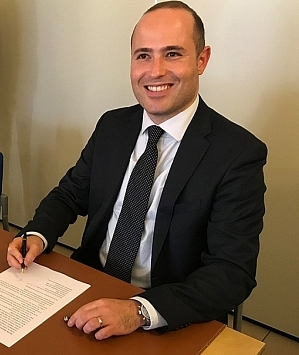A successful engagement with Namibia

Five questions to Tommy Piemonte, head of sustainability research at Bank für Kirche und Caritas (BKC), founding member of SfC
Tommy, in 2020, for the first time your bank has decided to engage with a State, Namibia. Why?
Namibia is one of the 14 UN member states that have not yet joined or ratified the UN Biological Weapons Convention. Bonds from Namibia have long been one of BKC’s bond investments – partly because of their attractive yields. However, since the 1st of January 2020, BKC has revised its exclusion criteria for government bonds adding the criterion “non-ratification of UN Biological Weapons Convention”.
This should have been a reason for exclusion…
True, but we learned that Namibia was no longer opposed to signing the convention. In addition, the country is well placed with regard to crucial sustainability criteria, such as the respect of civil and political rights, as well as the ratification of UN Convention against Chemical Weapons. That’s why we opted for engagement instead of disinvestment and we involved the whole SfC network in our efforts.
How can engagement be done with a state? Who did you talk to?
Since February 2020, we have been in contact with several high-ranking Namibian State representatives and diplomats. These include, in particular, the Minister of Finance and the Namibian UN Embassy in Geneva, which deals with this UN Convention, among other things. Numerous international contacts could be established with various EU and UN departments as well, which are active in the field of the UN Biological Weapons Convention. This helped the networking with Namibian contacts.
After one and a half years you see the first results of the engagement…
Yes, it has been a long and intense process but the first results are very rewarding. At the end of September we have received written assurance that the government of Namibia has decided to accede to the Biological Weapons Convention. Accordingly, a corresponding resolution is to be submitted to the Namibian parliament as soon as possible.
We are pleased that our persistent and cooperative engagement has played a supportive role. Various stakeholders around the UN Biological Weapons Convention have confirmed to us that we have contributed an important and unprecedented aspect of the discussion. This is because, for the first time, there will be motivation from the financial market for Namibia’s accession to the convention.
What happens now?
The commitment that has been made by the government allows our bank to keep Namibian government bonds in its portfolios. Of course, the process leading up to actual accession to the Convention and subsequent ratification will continue to be closely monitored.